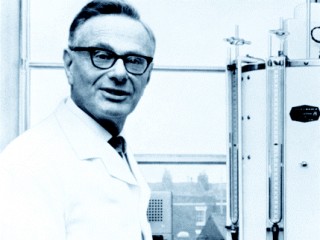
Hans Krebs biography
Date of birth : 1900-08-25
Date of death : 1981-11-22
Birthplace : Hildesheim, Germany
Nationality : German
Category : Science and Technology
Last modified : 2011-12-19
Credited as : physician and biochemist, discovered the urea cycle, Nobel laureate
0 votes so far
The latter, the key sequence of metabolic chemical reactions that produces energy in cells, is also known as the Krebs cycle and earned him a Nobel Prize in 1953, which he shared with Fritz Lipmann.
Born and raised in Germany, Hans Krebs followed in his father's footsteps, setting up his medical practice and specializing in eye, ear, nose, and throat ailments. He became more interested in research than treating patients, studied under Otto Warburg, and in 1932 he discovered the urea cycle (reactions in animal organisms, producing urea from ammonia). He fled to England in 1933, when the Nazis took power and Krebs, being Jewish, was denied academic employment.
In 1937, working at the University of Sheffield, Krebs researched and described the chemical reactions that occur in the presence of oxygen as substances formed by the breakdown of sugars, fats, and protein components are converted to carbon dioxide, water, and other compounds. These recurring reactions are now commonly known as the Krebs cycle. This discovery led to the Nobel Prize in Medicine, shared with the American Fritz Lipmann in 1953.
His son, Sir John Krebs, is a noted ornithologist, professor at Oxford, and member of the British House of Lords. Krebs is not related to another German-born Hans Krebs of the same era (1898-1945), a Nazi military General who committed suicide in his bunker as World War II ended.
Author of books:
-Energy Transformations in Living Matter (1957, co-author Hans Kornberg)
-Otto Warburg: Cell Physiologist, Biochemist, and Eccentric (1981)
-Reminiscences and Reflections (1981, co-author Anne Martin)
Timeline:
1900 Born in Germany
1918 Began medical school
1923 Graduated from medical school
1925 Graduated with Ph.D. from University of Hamburg
1932 Identification of Urea Cycle
1933 Emigration to the United Kingdom
1935 Appointed Lecturer in Pharmacology at University of Sheffield
1937 Identification of Citric Acid Cycle or "Krebs Cycle"
1945 Became a Professor at University of Sheffield
1953 Won the Nobel Prize in Medicine
1958 Knighted
1981 Died in the United Kingdom
















